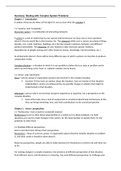Summary ‘Dealing with Complex System Problems’
Chapter 1 – Introduction
It matters what you do when at first sight it is not so clear what the solution is.
1.2 ‘Systems’ and ‘Complexity’
(Dynamic) system = A combination of interacting elements.
A system is a part of reality that has our special interest because we have one or more questions
about it that we would like to find answers for. The elements within such a system are physical things
(people, cars, roads, machines, buildings, etc.) but also people’s opinions, behavior, and different
political rationalities. The elements are also related to other elements (power relations,
dependencies of people among each other based on money, knowledge, formal positions, etc.).
As all elements interact, there will be many different ways in which a system can function to produce
comparable results.
Complex situation = a situation in which it is not possible to define the true state or problem and in
which no such thing as the ‘best’ or ‘optimal’ solution can be found.
1.3 ‘Actors’ and ‘Informants’
Actor = person, group or organization present and involved in the complex situation.
Involved they have an opinion about the situation, have an interest in that situation
(stakeholders), and/or are influenced by any possible change or solution that might be
implemented in that situation.
Informant = person who is not involved, but given experience or expertise, has a perspective on the
complex situation.
Some informants have a lack of involvement or emotional attachment but because of this
they can bring interesting, new, and fresh contributions to the overall perspective.
Chapter 2 – Actors’ perspectives
2.2 ‘Restlessness’ fuels a need for systematic analysis
Restlessness is just as often about opportunities in a system as it is about problems. For both
situations you want to make changes in the system, for the opportunities to exploit them, for the
problems to solve them.
2.3 Multiple different perspectives
Actors and informants all have their perspectives.
Perspective = ideas of a person, group, or organization about what the complex situation or problem
is, and what could or should be done about it.
Based on perspectives, people are able to make decisions for themselves on what to do and what not
to do.
For making changes in complex situations, the existence of different perspectives of that situation
from different actors and informants is a blessing. You need different perspectives to challenge your
, own perspective, to enrich your own perspective and you need others to get more and more ideas
for what can be done to improve the complex situation you are facing.
2.4 Identifying Actors and Informants
Systemic analysis of a complex situation.
Step 1: identify different perspectives on it from both (involved) actors and (uninvolved) informants.
For the actors you would like to know more about how they relate to each other, and
also how they relate to you.
Step 2: sketch in a few lines what your complex situation is about and make a list of people whom
you might encounter when considering the complex situation
Who walks, literally, around in the area of the complex situation? Who will raise their
voices when something would change in that situation? Who is happy with the current
situation, and who is not? Who are the leaders in the current complex situation? Who is
capable of controlling anything in that complex situation?
2.5 Mapping Actors
Informants are not in any way involved in the complex situation. But they are willing to talk to you
about this complex situation and share their opinion and ideas They help to create a richer picture
of the complex situation.
Actor’s roles in complex situations are all very different because they can be involved in the situation
for all kinds of reasons. And they need other actors to do what they have to or want to do. Contrary
to the role of informants, actors and their interacting roles influence the complex situation
substantially.
Creating an overview of the multiple and dynamically interacting actor relations can be very helpful
for you for many reasons. An important one is that it helps you to identify enough variety in actors
and their perspectives. When drawing a map, you can look at who has power over who, who has
more knowledge, from who does the money come/to whom does the money flow?
It’s important to not forget yourself when drawing a map. What is your role? Are you the owner of
the problem? If yes, then you are the one who should take action and coordinate the change in the
complex situation to it better. It’s important that the actor who is either held responsible or feels
responsible to solve the problem has enough capabilities (power to influence the system and make
changes) to implement solutions.
Power vs. interest is very common for a ranking map. You can also use hardly suffer vs. ones who
suffer most.
Why should you draw a map?
1. You can create a few possible explanations, merely hypotheses, of how and why the actors in
the complex situation move, behave, and act the way they do.
2. You can form ideas about how actors might act, move, or behave when the complex
situation changes.





